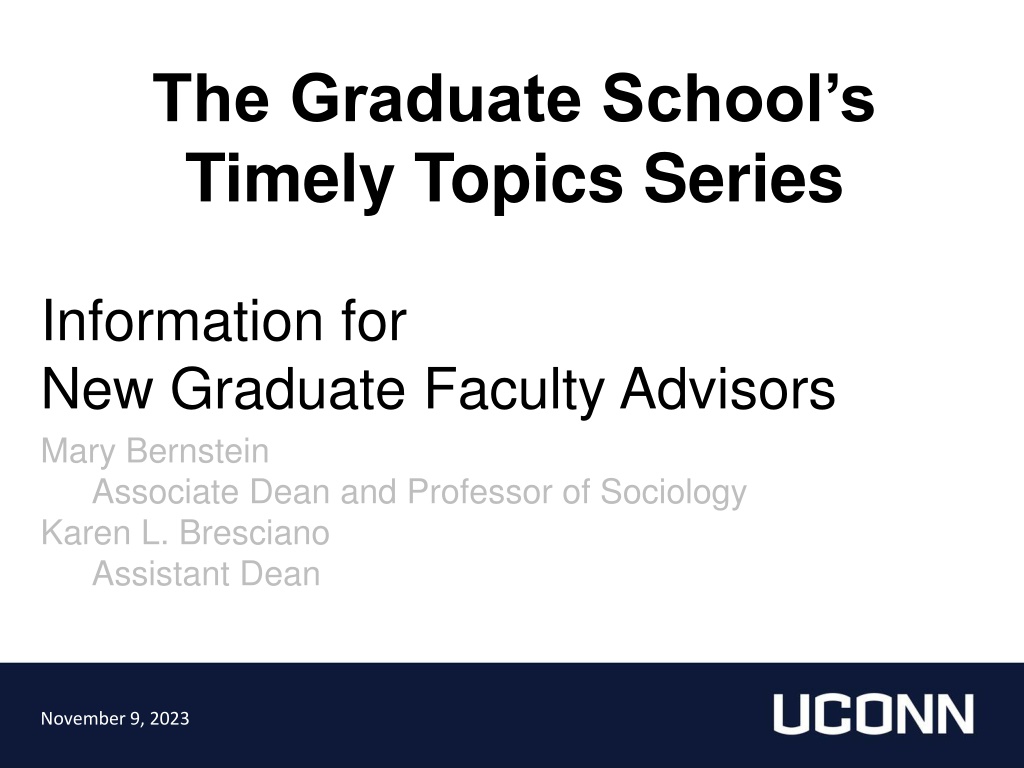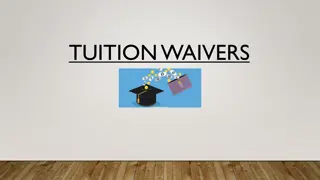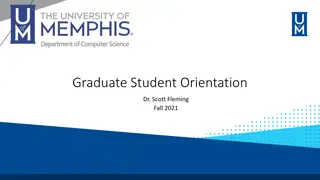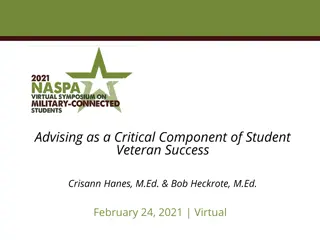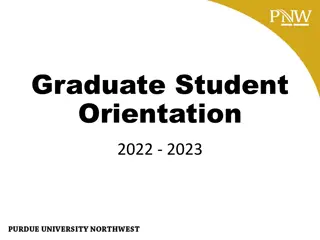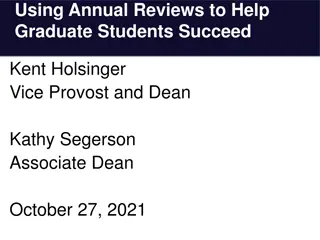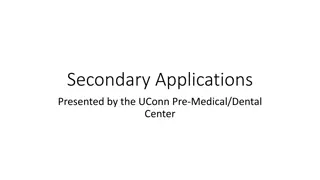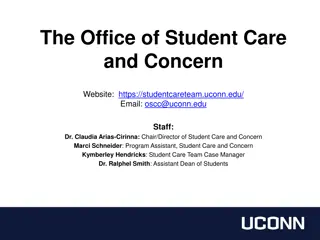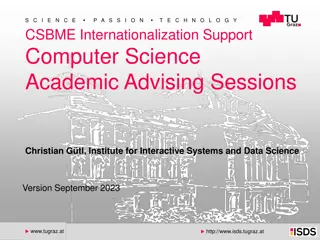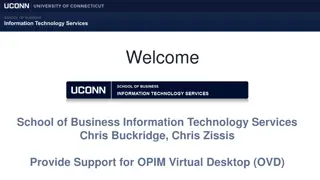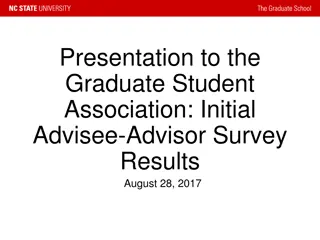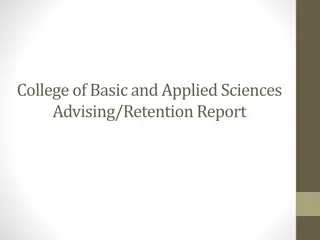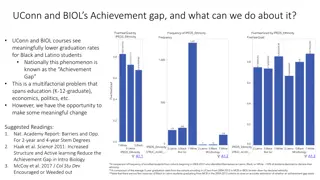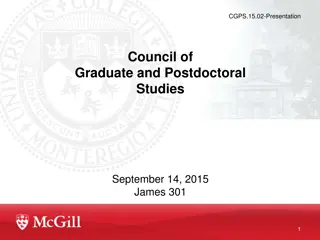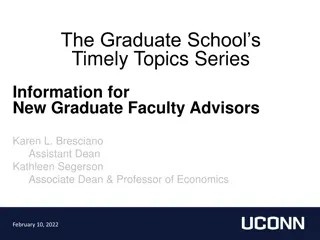Understanding Graduate Student Advising at UConn
Explore the dynamics of graduate student advising at UConn, including the roles and responsibilities of advisors, tips for effective advising, challenges faced, available resources, and degree requirements. Gain insights on creating positive impacts and fostering a supportive advisor-student relationship. Uncover the importance of major advisors, advisory committees, and meeting program-specific requirements.
Download Presentation

Please find below an Image/Link to download the presentation.
The content on the website is provided AS IS for your information and personal use only. It may not be sold, licensed, or shared on other websites without obtaining consent from the author. Download presentation by click this link. If you encounter any issues during the download, it is possible that the publisher has removed the file from their server.
E N D
Presentation Transcript
The Graduate Schools Timely Topics Series Information for New Graduate Faculty Advisors Mary Bernstein Associate Dean and Professor of Sociology Karen L. Bresciano Assistant Dean November 9, 2023
Overview of todays topics How does graduate student advising work at UConn? What are the roles and responsibilities of advisors? What are some tips for being a good advisor? What are some advising challenges and how can you work through them? What resources are available to help advisors?
Things to Keep in Mind Past: What do you remember (good and/or bad) about your own advisor, and what can you learn from your own experience? Future: What kind of advisor do you hope to be?
Opportunity for Positive Impact Evidence for a mental health crisis in graduate education Teresa M Evans, Lindsay Bira, Jazmin Beltran Gastelum, L Todd Weiss & Nathan L Vanderford VOLUME 36 NUMBER 3 MARCH 2018 NATURE BIOTECHNOLOGY
Advising at UConn Every UConn graduate student must have a major advisor (or co-major advisors) who is a member of the Graduate Faculty. How to Request Appointment to the Graduate Faculty Change of Graduate Major Advisor form (will update advisor information in Student Admin) Most also have a 3-4 person advisory committee, chaired by the major advisor. Some programs have a non-faculty director or other staff person who does most of the advising and acts on behalf of the faculty member who is the designated major advisor At UConn, major advisor/advisory committee determines when/if a student has met the requirements for a given degree (or certificate), subject to Graduate School (and potentially program-level) minimum requirements.
Degree Requirements The Graduate School sets minimum degree requirements Minimum credit requirements (30 for master s, 30-45 for PhD, including required research credits) Minimum GPA requirements (3.0) Allowable credit sharing and transfer credits Time limits (6 years for master s, 8 for PhD) Programs can set additional requirements. Major advisors/advisory committees can also set requirements for students, as long as they are clearly articulated to students and applied equitably.
Key Forms of Advisor-Student Relationships In course-based programs: advisor primarily provides information to students In research-based programs: apprenticeship model advisor works closely with student relationship often evolves from supervision to collaboration
Key Roles and Responsibilities of (Major) Advisors Information and advice about program completion Courses to take Other program requirements Places to look for information (e.g., graduate catalog, Graduate School, program handbooks, websites) Research supervision and training Professional development assistance Career advice/counseling Career enhancement opportunities Approvals (or recommendations) related to academic program Completion of degree requirements (plans of study, general exams, dissertation defenses, etc.) Some course-related approvals (e.g., withdrawals, Pass/Fail) Program interruptions/terminations (e.g., academic leaves of absence, dismissals) Advice and referrals to address student needs and concerns
Mentorship Defined Mentorship is a professional, working alliance in which individuals work together over time to support personal and professional growth, development, and success of the relational partners through the provision of career and psychological approach 9
Tips for Good Advising/Mentoring NEW Graduate Student Mentoring: A Mentor s Guide Created in collaboration with faculty, professional staff, and graduate students and endorsed by the GFC A set of best practices for graduate faculty and departments Intended as a baseline Programs are encouraged to developed specific guidelines as it pertains to their programmatic needs
Tips for Good Advising/Mentoring Overarching Tip: Foster meaningful 2-way communication Communicate clearly, constructively, and regularly Provide clear, constructive, and regular feedback to students Seek feedback from students on the effectiveness of communication Source: https://rackham.umich.edu/downloads/how-to-mentor-graduate-students.pdf
Tips for Good Advising/Mentoring Expectations Be transparent about expectations Academic expectations and standards Needed training (and where to get it) Personal and professional boundaries Academic Success Set and review milestones, and acknowledge student accomplishments Look for and create opportunities for students to succeed Help students learn from mistakes Encourage students to develop new skills and think critically and independently Overall Well-being Be open, approachable, and accessible Listen to student concerns and respond constructively Look for and respond to signs of stress/distress, and reach out as appropriate Source: https://rackham.umich.edu/downloads/how-to-mentor-graduate-students.pdf
Aligning Expectations Mentors should have the knowledge and skills to: Listen to and consider the expectations of their mentee in the mentoring relationship Consider how personal and professional differences may impact expectations Clearly communicate expectations for the mentoring relationship Align mentee and mentor expectations 13
Aligning Expectations What strategies do (or can) you use to identify your own expectations, those of your mentee, and align the two? Mentorship Action Plan Identifies mentee needs, mentor ability and the domain to align expectations E.g., Domain of mentoring need could be: - Oral Communication, work-life balance, data analysis, networking with research community 14
Addressing Equity and Inclusion Mentors should have the knowledge and skills to: Understand the concepts of equity and inclusion and their influence on mentor-mentee interactions Recognize the impact of conscious and unconscious assumptions, preconceptions, biases, and prejudices on the mentor-mentee relationship and acquire skills to manage them Identify concrete strategies for learning about and addressing issues of equity and inclusion 15
Annual Academic Reviews Annual academic reviews can help advisors and students articulate and document both progress toward degree and expectations going forward. TGS has developed a customizable template for doing annual reviews for doctoral/MFA students Allows students to report and reflect on their progress and accomplishments during the previous year and plan their activities and efforts for the coming year Aids major advisors in providing their graduate students with feedback on their progress to date and plans
Possible Advising Challenges Student is not making adequate academic progress Not completing coursework Not progressing adequately on research Student appears to be suffering from non-academic challenges (e.g., physical/mental health issues, other personal/family issues) Failure to see eye-to-eye or agree on plans moving forward Difficult inter-personal dynamics between advisor and advisee (personalities play a role in all relationships) Misunderstandings (typically due to communication issues)
Resources to Help TGS website: Graduate Faculty Onboarding An overview of resources helpful to new graduate faculty advisors Advising and Mentoring: Supporting Your Graduate Students Includes resources for advisement meetings, mentoring, supporting graduate student mental health, cultural competency, and more Graduate Student Mentoring: A Mentor s Guide Timely Topics Slides and videos from prior sessions that include a variety of topics surrounding advising and mentoring, GAs, and admissions/recruitment
Resources to Help TGS staff: Graduate Student and Postdoctoral Affairs Team Things they can help with: Having difficult conversations Referrals to other university resources (e.g., mental health, CSD) Making changes when more is needed Karen Bresciano: karen.bresciano@uconn.edu Megan Petsa: megan.petsa@uconn.edu Stuart Duncan: stuart.duncan@uconn.edu Ombuds Office Things they can help with: Neutral resource that provides confidential and informal assistance Assistant Ombuds for Graduate Students and Postdocs
When More is Needed Reduced course/credit load Implications for GA, financial aid, visa status Change of major advisor Separation Academic leave of absence Voluntary exit/change of program Dismissal Student Care Team
Dismissal Criteria for Dismissal 1. Failure to maintain the minimum cumulative grade point average required by The Graduate School (3.0); 2. Receiving a grade of D+, D, D-, F, or U in any course; 3. If required, failure to satisfy a foreign language requirement for a degree; 4. Failure of the doctoral General Examination, if one is required; 5. Failure to produce an acceptable Doctoral Dissertation Proposal, if one is required; 6. Unsatisfactory performance in any aspect of the research or writing for a required master s thesis or doctoral dissertation; 7. Failure of a required final examination for the master s or doctoral degree; or 8. Failure to satisfy any other requirement of the student s graduate degree program. Dismissal vs Resignation
Graduate Assistants GAs have a dual relationship to the university as both students and employees In addition to resources available as part of their student status, GAs have access to employee benefits such as GA Leave, employee accommodations, the Employee Assistance Program (EAP), and more Ask for guidance decisions made on the academic side can have GA implications and vice versa Union Contract for GAs employed at Storrs/regionals (not UCH yet) Protected work Time off (10 days per semester) Progressive discipline (Labor Relations) Alison Cutler (alison.cutler@uconn.edu) Additional resources and referrals for GAs Timely Topic: Supervising Graduate Assistants
International Students Visa status is impacted by enrollment add/drop program change dates of separation OPT/CPT and I-20 end dates Ask ISSS for guidance
Please Know what you know and what you don t know Know what things are your responsibility to know Know who is supposed to know what you don t know
Its not all you Center for Career Development Student Health & Wellness Counseling & Mental Health Financial Aid Office of National Scholarships & Fellowships Writing Center Student Care Team Cultural Centers International Student & Scholar Services Center for Students with Disabilities Registrar Library Graduate Student Senate Assoc of Area Religious Communities Ombuds Office Graduate Employee Union And more
Questions How to support grad students who are struggling Setting accountability goals for student success Why, when and how to terminate an advising relationship if it is not working out I hope to be educated about resources that the University makes available to students, as well as advice on how to introduce the resources to students who may benefit from them. Other?
And, of course The Graduate School 860.486.3617 gradschool@uconn.edu
Upcoming Events Timely Topics Timely Topics is a series of opportunities to engage with subject matter experts on topics relevant to those who support and advise graduate students and programs. Every session is available to all UConn faculty and staff. SCOTUS Decision on Race in Admissions and Impacts on Graduate Admissions Thursday, November 16, 2023 at 11:00 am Updating Your Catalog Copy and Using the GPAR System Thursday, November 30, 2023 at 11:00 am Fellowships Process and Updates Thursday, December 7, 2023 at 11:00 am Register for a Session
